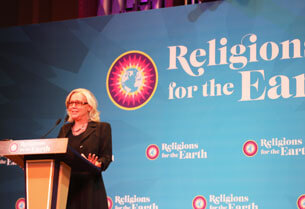The Religions for the Earth Conference was held at the Union Theological Seminary from 19-20 September 2014. Faith leaders and climate activists gathered together with the united goal to act on climate change, advocate for the protection of our environment, and celebrate our God-given mission to care for the creation entrusted to us.
The conference was designed to call out the moral imperative to care for our natural world and call for social justice. Participants came together across diverse traditions to provide leadership for the earth in a historic and critical moment, with the agreement that, as Dr. Melanie Harris from Texas Christian University highlighted, “Until the earth is free, no-one is free”.
Taking place just days before the United Nation’s Climate Summit, which will convene on Tuesday 23rd September 2014, participants at the conference sought to inspire faith leadership in climate action and give impetus to the discussions that would take place between world leaders at the upcoming Summit.
Presentations and panel discussions highlighted the consensus among the faiths that the world was created interconnected; everything we do as humans impacts on our environment and affects the balance of creation. Speakers agreed that we as humans have not managed our world as we have been called to do, and that urgent radical action is necessary to protect our planet and give back balance to creation; and we need to act selflessly and sacrifically to do so.
Workshops explored faith issues on climate action, sharing innovative approaches to climate activism within traditions, strengthening and expanding connections between faith leaders and activist organisations, and mobilising participation in a global, multifaith network that will support ongoing activism and commitment to the cause.
Paulo Ueti, Anglican Alliance Regional Facilitator for Latin America and the Caribbean, joined a workshop discussion called, ‘Climate Change and Economic Disparity’. Paulo spoke alongside Ana Garcia-Ashley from The Gamaliel Foundation, Dr. Tobias Winright from St. Louis University, and Adrian Shaw from the Church of Scotland.
In conversation with Rev. Thia Reggio, from the Presbytery of New York City, Dr. Muhtari Aminu-Kano of Islamic Relief Worldwide, and Aaron Acharya, from the American Jewish World Service, Fr. Edwin highlighted the role that the church plays in disaster relief as the one of the longest-standing parts of the local community.
Panel members noted that, because of changing weather patterns and climate change, the relief response to disasters is no longer time-limited but ongoing and long term. Fr. Edwin spoke on the presence of the local church before, during and after a natural disaster strikes, and addressed the need for the church to be a key player in advocacy. He said:
“We need to address the disconnect between the high level conversations and the local people’s experiences. Our communities don’t understand that these disasters are happening because of climate change and changing weather patterns; they don’t understand that we can do something about this in a bigger way.”
He also commented on the need for the conversation to be mutual, saying, “The church needs to lift their voice to their leaders. When these world leaders are faced with the reality, and start to understand how it really is for us on the ground, they can start making decisions that help us. They can’t ignore us any more.”
Paulo Ueti said, “Every religion cares about the earth and the fullness of life. This unites us and strengthens our struggle to journey together to eradicate inequality and fight climate change. Hundreds of people here are involved in a common effort to raise voices and take action to care for the planet and the life in it. The Anglican Alliance, with our family across the Anglican Communion, are very committed to this cause. Christina Manning, Communications and Learning Manager, and I are both a part of the events here in New York. Let’s all join this movement: be a part of the Oceans of Justice campaign and all of the global events taking place at this time. Let’s raise our voices and act for our world.”
Conference participants are taking part in the People’s Climate March in New York on Sunday 21st September 2014, and will celebrate together with members of the public at an interfaith service at the Cathedral of St John the Divine on Sunday evening.
In the picture: Dr Serene Jones, President of the Union Theological Seminary, opens the Religions for the Earth conference.

